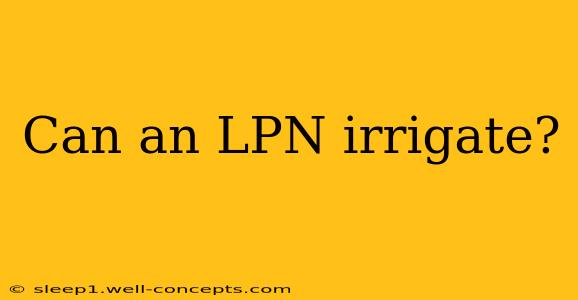The question of whether a Licensed Practical Nurse (LPN) can irrigate depends heavily on several factors: the specific state's Nurse Practice Act, the LPN's training and experience, the type of irrigation, and the specific clinical setting. There's no simple yes or no answer. This detailed guide will explore these factors, providing clarity and insight into this common question.
Understanding the Scope of Practice for LPNs
LPNs, also known as Licensed Vocational Nurses (LVNs) depending on the state, have a defined scope of practice that varies slightly from state to state. This scope outlines the nursing tasks and procedures they are legally permitted to perform. Crucially, each state's Nurse Practice Act is the ultimate authority on what an LPN can and cannot do. It's crucial to consult the specific regulations of your state or jurisdiction.
Types of Irrigation and Their Implications for LPNs
Irrigation procedures cover a broad range of medical interventions, and the complexity significantly impacts whether an LPN can perform them. Simple irrigations, such as bladder irrigation or wound irrigation with normal saline under direct supervision, might fall within the typical scope of practice. However, more complex procedures, such as:
- Intraoperative irrigation: Typically performed by surgeons or surgical nurses during a procedure.
- Irrigation of deep wounds or abscesses: Often requiring advanced skills and assessment.
- Irrigation involving specialized solutions: Requiring specific knowledge and training.
These complex irrigations would likely be beyond the scope of practice for most LPNs without specific advanced training and direct supervision by a physician or Registered Nurse (RN).
Factors Influencing LPN Irrigation Authorization:
- State regulations: As previously mentioned, state Nurse Practice Acts vary significantly. Some states might permit LPNs to perform a wider range of irrigations than others.
- Employer policies: Even if state law allows it, the employing healthcare facility might have internal policies that restrict certain procedures to RNs or other healthcare professionals.
- Training and experience: An LPN with extensive training and documented experience in a specific type of irrigation might be authorized to perform it under supervision. Conversely, a newly licensed LPN would likely need more supervision or have restrictions on this type of procedure.
- Level of supervision: Many irrigation procedures, even simple ones, require at least indirect supervision by an RN or physician. Direct supervision might be required for more complex irrigations.
Seeking Clarification
If you are an LPN with questions about your ability to perform a specific irrigation procedure, the best course of action is to:
- Consult your state's Nurse Practice Act: This document is the legal guideline for your scope of practice.
- Review your employer's policies and procedures: Your workplace will have specific guidelines regarding procedures and responsibilities.
- Seek clarification from your supervisor or a registered nurse: They can provide guidance based on the specific situation and your qualifications.
- Consult with a legal professional: If there is any uncertainty or if a situation arises where your actions are questioned, legal counsel can provide valuable advice and representation.
In conclusion, the answer to whether an LPN can irrigate isn’t straightforward. It is crucial to understand your state's regulations, your employer's policies, your personal training and experience, and the specific nature of the irrigation procedure. Always prioritize patient safety and legal compliance by seeking clarification when necessary. This approach ensures you adhere to your scope of practice and provide the best possible care.

